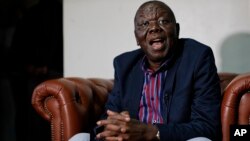Zimbabwe’s longtime opposition leader and former Prime Minister, Morgan Tsvangirai, has lost his battle with colon cancer, which he disclosed in June 2016 - his dream to lead the southern African nation, never realized.
Born March 10th, 1952, in Gutu, Masvingo province, Morgan Richard Tsvangirai rose from humble beginnings with only a high-school education, to become one of Zimbabwe’s most formidable political and influential figures, earning national, regional and international recognition and respect. The first of nine children from the union of Dzingirai-Chibwe Tsvangirai and Lydia Zvaipa, Tsvangirai’s rise to national prominence stems from his days as the secretary general of the Zimbabwe Congress of Trade Unions (ZCTU) in 1988, where he led national strikes for the betterment of the country’s workers.
Vibrant and energetic, Tsvangirai, a former member of the ruling Zanu-PF party, became a force to reckon with when the ZCTU he led transitioned into a political party in 1999, with him as its founding president. For almost 20-years since its formation, Tsvangirai and his MDC party centered their message of change on President Robert Mugabe, who has since left office, ousted by the military, in November 2017. However, with Zanu-PF still in charge, now led by former Vice President Emmerson Mnangagwa, Tsvangirai pressed on with his message of change, promising his loyal supporters victory over Zanu-PF, despite his failing health.
JOURNEY TOGETHER
“We have travelled this journey together and we’ll complete it together….we have, for the last 20-years, embarked on this journey against this dictatorship.”
Tsvangirai’s strength as an opposition leader was first realized a few months into the formation of the MDC party, when it contested in the 2000 parliamentary elections and clinched 57-seats to Zanu-PF’s 62 – an unprecedented victory since Zanu-PF’s 1980 election victory.
Tsvangirai’s attempt at the presidency two years later, were preceded by accusations of plotting to assassinate President Mugabe, which resulted in his arrest on treason charges. Following his presidential defeat to Mugabe in 2002, Tsvangirai endured more arrests on charges of civil unrest, and a lengthy treason trial before being acquitted in 2004.
In 2007, a year before yet another crucial general election, Tsvangirai endured more assaults at the hands of the state security, for his involvement in anti-government protests. Speaking after his release, Tsvangirai castigated the government’s brutality against citizens.
“Saddest attack on defenseless people.”
The 2008 elections marked another significant political moment for the opposition leader, when he reportedly won the first round of the presidential elections with 47.9% of the votes compared to Mugabe’s 43.2% - a fact acknowledged even by President Mugabe and his wife, Grace. However, due to the violence that preceded the run off, Tsvangirai and his party decided not to contest the elections, assuring victory for Mugabe and his party.
“We in the MDC have resolved that we will no longer participate in this violent, illegitimate, sham of an election process. The courageous people of Zimbabwe, this country, and the MDC have done everything humanly and democratically possible to deliver a new Zimbabwe.”
Though Mugabe claimed election victory, Tsvangirai and his party lobbied regional and international bodies to intervene and challenge the outcome. The result was a negotiated Global Political Agreement, facilitated by the Southern African Development Community, headed by then South African President Thabo Mbeki, which paved way for a five-year shared government between the MDC formations and Zanu-PF.
UNITY AGREEMENT
In February 2009, Tsvangirai took the oath of office as Zimbabwe’s prime minister, with Mugabe, who held the position of prime minister until 1987, remaining firmly at the helm as president.
Less than a month after becoming prime minister, tragedy struck Tsvangirai when his wife of more than 30 years – Susan – died in car accident. Tsvangirai was in the same car, but survived.
During the five-year term of the unity government, Tsvangirai and his party received credit for improving the economy and Zimbabwe’s image internationally, but also criticism for failing to address fundamental issues such as electoral reforms.
Despite his hopes of a favorable election outcome in 2013, Mugabe again defeated Tsvangirai by garnering 61% of the vote against the opposition leader’s 34%, in an election that several observers labelled credible and fair, though some noted some irregularities. Tsvangiirai challenged the election outcome in court, but withdrew his court challenge a few weeks later.
MOUNTING CHALLENGES
Aside from his political battles with Zanu-PF, Tsvangirai also faced mounting challenges from several prominent members of his own party, many of whom left to start their own parties, due to what some called Tsvangirai’s “dictatorial” tendencies and lack of vision. Tsvangirai faced his first major internal opposition in 2005, over disagreements to contest the Senate elections. Many of the breakaway members continued to use elements of the MDC name, often creating confusion.
Tsvangirai faced another challenge when he was diagnosed with colon cancer in June 2016, which he shared publicly. Following his diagnosis, which involved various rounds of chemotherapy, Tsvangirai faced various calls to step down, citing his inability to withstand the pressures of the election campaign. Despite criticism, Tsvangirai remained determined to see the elections through.
“I’m not a stone, I am a human being. And so the doctor advised that I should take it easy for a while. I am back at work, I was at work yesterday, just to dispel some of the speculations about Tsvangirai collapsing again and going into hospital again.”
MARRIAGE
Now remarried to Elizabeth Macheka, Tsvangirai drew ridicule during his tenure as prime minister, after reports surfaced of his alleged womanizing, and recklessness. Among the most public was his short marriage to Lorcadia Karimatsenga, who he divorced a short time later.
Despite his shortcomings as a politician and private citizen, Tsvangirai gained the respect of many in Zimbabwe and around the world, for his bravery as a political opponent to Mugabe and the ruling Zanu-PF party. Among the various recognitions Tsvangirai received were Nobel Peace Prize nominations in 2008 and 2009, honorary doctorate degrees and others. Tsvangirai’s decision to go public with his cancer diagnosis and his courageous fight against the cancer that ultimately deprived him of the opportunity to fulfil his dreams of a new Zimbabwe as its president, also gained him additional respect.
He is survived by several children and his wife, Elizabeth.






